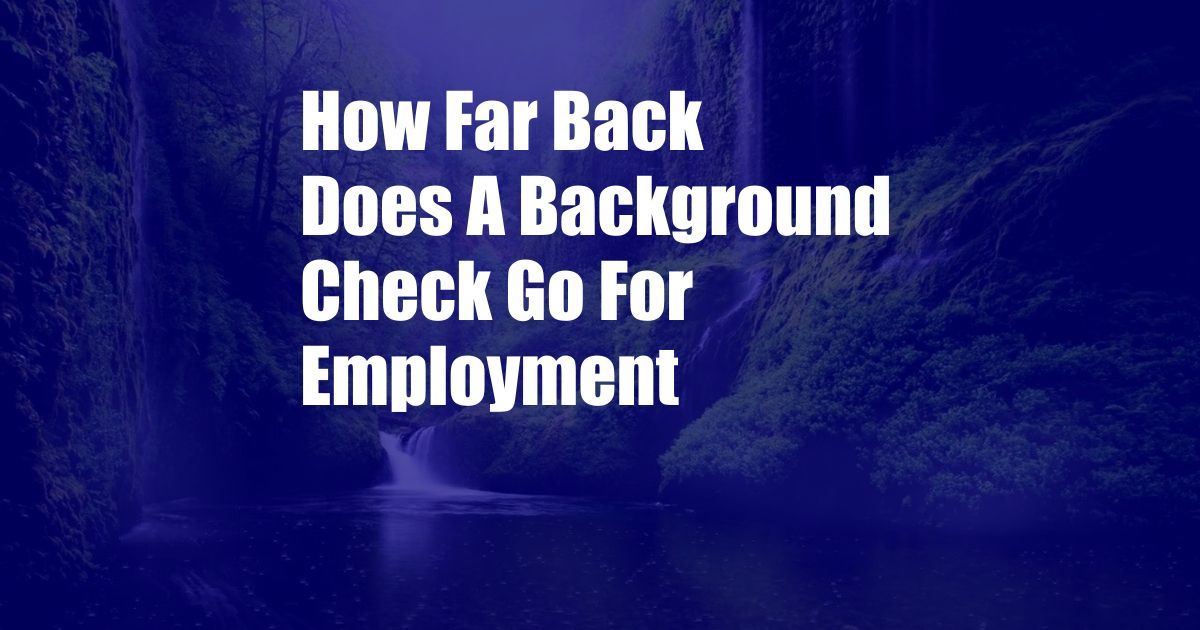
How Far Back Do Background Checks Go for Employment?
When you’re applying for a new job, you may wonder how far back a background check will go. After all, you don’t want any skeletons in your closet to come back to haunt you. The good news is that most background checks only go back 7 years. However, there are some exceptions to this rule. For example, if you’re applying for a job in the financial industry, your background check may go back further. Additionally, if you have any criminal convictions, they will likely show up on your background check, regardless of how long ago they occurred.
In general, background checks include the following information:
- Criminal history
- Credit history
- Employment history
- Education history
- Reference checks
The specific information that is included on a background check will vary depending on the employer and the job you’re applying for. However, most background checks will include at least some of the information listed above.
How to Prepare for a Background Check
If you’re expecting to have a background check done, there are a few things you can do to prepare:
- Order a copy of your own background check. This is a good way to see what information is on your report and to identify any potential red flags.
- Dispute any inaccurate information. If you find any inaccurate information on your background check, you can dispute it with the reporting agency.
- Be prepared to explain any negative information. If you have any negative information on your background check, be prepared to explain it to your potential employer.
Preparing for a background check can help you avoid any surprises and increase your chances of getting the job you want.
The Latest Trends in Background Checks
The background check industry is constantly evolving. Here are a few of the latest trends:
- Social media screening. More and more employers are using social media screening to get a better idea of their potential employees.
- International background checks. As the global economy becomes increasingly interconnected, employers are increasingly conducting international background checks.
- Pre-employment drug testing. Many employers are now requiring pre-employment drug testing as a condition of employment.
Tips for Employers Conducting Background Checks
If you’re an employer, here are a few tips for conducting background checks:
- Use a reputable background check company. There are many different background check companies out there, so it’s important to do your research and choose a reputable company.
- Be clear about what information you want. When you order a background check, be clear about what information you want the report to include.
- Use the information fairly. The information on a background check should only be used for making hiring decisions. It should not be used to discriminate against any applicant.
Conclusion
Background checks are an important part of the hiring process. By preparing for a background check and following the tips above, you can help ensure that you get the job you want.
Are you interested in background checks?
FAQs on Background Checks
Q: How long does a background check take?
A: The time it takes to complete a background check can vary depending on the complexity of the check and the background check company you use. However, most background checks take between 24 and 72 hours to complete.
Q: How much does a background check cost?
A: The cost of a background check can vary depending on the type of check you need and the company you use. However, most background checks cost between $50 and $100.
Q: What should I do if I have a criminal record?
A: If you have a criminal record, you should be honest with your potential employer about it. You should also be prepared to explain the circumstances of your crime and how you have changed since then.
Q: Can I get a job if I have a criminal record?
A: Yes, you can get a job if you have a criminal record. However, it may be more difficult to find a job, and you may not be eligible for certain jobs.
Q: What are my rights under the Fair Credit Reporting Act (FCRA)?
A: The FCRA gives you certain rights regarding background checks. These rights include the right to obtain a free copy of your credit report, the right to dispute any inaccurate information on your credit report, and the right to be notified if your credit report is used for employment purposes.